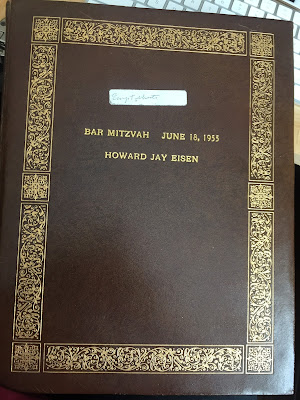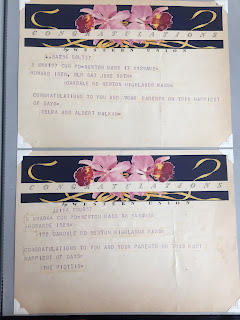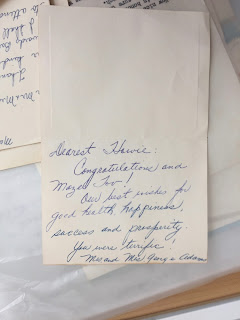Sadly, he is no longer alive. He passed away in 1987, when I was a freshman in college. It was a painful ending of his life. I have written about this. As has my brother Michael. As have some other people here and there. If you want to know more about that, well, here are some links to read.
- A day to think, to pause, to ponder. Posted by me February 7, 2013.
- My quest to free my father's publications
- David Dobbs in Wired Free Science, One Paper at a Time
- David Dobbs follow up "Jonathan Eisen frees (almost all) his father's papers."
- My page about this
- Mother Jones article about my brother Michael Eisen with a discussion of our father.
- My brother's post from February 8, 2013: My father, Aaron Swartz, and assigning blame for suicide
- My brother on scientific witchhunts: Yoshiki Sasai and the deadly consequences of science misconduct witchhunts
But that is not what I want to write about today. The pain of his suicide will be with me forever I am sure. But I want to focus on his life. And that I know remarkably little about. So it was with great interest that a few years ago his sister Arleen came to visit us in California. And as part of this visit she gave me my father's Bar Mitzvah Book.
I glanced at it and then it sat in a box for a while. I have never been religious and did not have a Bar Mitzvah myself. So it seemed foreign to me.
But then, when Arleen passed away relatively suddenly, I felt really disconnected form my father's history. And so one day I opened the book and leafed through it more carefully. And I became a bit obsessed with it. The book had dozens of pictures from the event. And cards and telegrams congratulating my father. And all sorts of notes and notations of various kinds. I barely recognized any of the people. Of course, this was from 1955 so that is not that surprising. But part of this is that I have never been that close to my father's family. I always got along with them, but just never saw them that often before my father died and even less afterwards. So the key to me was - how could I figure out just what was in the book. And more importantly to me, could I figure out who was at this event. This was one of the only tangible things I had to hold about my father's childhood. I did not know too many stories. I did not have many artifacts of any kind. And here was this major major event. And I literally had the book about it.
So today I am here to tell you, I have digs into this book. And stunningly, it not only told me about one event, it told me about my family. A lot. It did this because I was able to figure out who most of the people were at the Bar Mitzvah - and most of them were family. In addition, I have used some family tree databases such as Ancestry and My Heritage to track down information about these people and have been able to use this one book to basically figure out, I think quite accurately, many generations of my father's family tree.
I am going to have to tell this story in many parts. It is long. And complicated. But it all started with one book.
The first page of the book had a picture of my dad and a little card
And the rest of the book was filled with notes, pictures, and cards. And a lot of it was very unfamiliar. The pictures were what really got to me since I recognized so few of the people in them. Here are the pics.
But fortunately there was other information in the book. Some of it was all the congratulation cards and telegrams he and his family received. See for example these
But it was other details about the Bar Mitzvah itself that ended up being the most interesting and useful to me. For example, my grandmother even kept all the details on planning the food
And also included in the book was information on the ceremony - the order of events and who did what. This was helpful since these actually listed some names of people I knew very little about.
But fortunately there was other information in the book. Some of it was all the congratulation cards and telegrams he and his family received. See for example these
But it was other details about the Bar Mitzvah itself that ended up being the most interesting and useful to me. For example, my grandmother even kept all the details on planning the food
My grandmother also included many of the key details of the event - the invitation, the save the date card, and other such materials
And also included in the book was information on the ceremony - the order of events and who did what. This was helpful since these actually listed some names of people I knew very little about.
But the absolute most important parts to me were two types of items. One of them was all the information about the tables - who sat where. This would turn out to be very important (more on this another time). But see the details below:
And the children ...
And then. The key to it all. Underneath another item. Four pieces of paper. Four pieces that served as the key to unlocking the secrets of my father's family. My grandmother kept, and included in the book, the list of invitees including ALL sorts of details about them that would serve to be critical - though it took a little bit of time to figure out what all of this meant. Here are those pages
These yellowed fragile pieces of paper were just incredible. It took me months to figure out all of what they had to reveal. But now I have. I have managed to use these sheets of paper and some other information in this book, in conjunction with searches of old records and various family tree websites, to figure out basically who all the people at the Bar Mitzvah were and also figure out who all of my father's aunt's uncles, cousins, great aunts and uncles and others were and thus infer a huge swath of my family tree.
So in honor of my father on his 75th birthday I am posting this. His Bar Mitzvah book, put together I am sure by his mother, kept by his mother, and passed on to me, is a time capsule looking not just 62 years into the past but even further, into the 1800s where I have found records of my father's family in Eastern Europe only because I had the information in this book.
Now I am sure there would have been other ways to find this information out. I could have contacted my father's remaining relatives. I actually tried to do this a bit but I just did not get much information and I confess I was not very persistent. Somehow, searching and searching and searching to understand what was in this book, and digging into all sorts of online records, was cathartic. And I hope, it will also be interesting to some out there as I tell this story of what this book revealed.



















































































